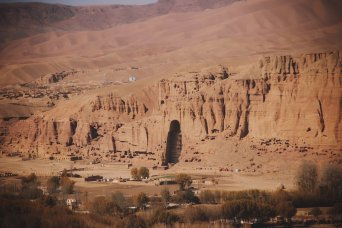- About
- Topics
- Story
- In-Depth
- Picks
- Opinion
- News
- Donate
- Signup for our newsletterOur Editors' Best Picks.Send
Read, Debate: Engage.
| topic: | Freedom of Expression |
|---|---|
| located: | Afghanistan |
| editor: | Shadi Khan Saif |
Afghanistan’s shrinking journalist community, which is performing the noble duty of demanding accountability from the hardline Taliban authorities, suffered a deadly blast in the northern Balkh province on 11 March.
Although no group has taken responsibility for the attack that claimed one life and left dozens of journalists wounded and terrified, it is presumed that it was carried out by ISIS. The journalists were joined in a gathering organised to highlight their struggle to report the truth.
The bombing, to be clear, was not carried out on a war front, which indicates the grim level of vulnerability and lack of protection that journalists in Afghanistan face. Prior to this latest lethal attack, journalists and media organisations in Afghanistan have witnessed a barrage of ever-increasing curbs to press freedom, intimidation and persecution, resulting in self-censorship. Since the Taliban takeover, the state of press freedom has gone from bad to much, much worse.
The job of exposing and reporting on the wrongdoings of the powerful and dangerous individuals and groups is a daunting task anywhere in the world - and extremely deadly in places like Afghanistan.
Yet, societies can only survive and flourish when the institution of the press helps ensure transparency and justice. No political or theological system of governance has the moral authority to shun journalism, which amounts to shutting the eyes, ears and mouths of the people. Hence free press is no less than a basic human rights of all individuals globally, including of course in Afghanistan.
Afghanistan’s once vibrant and independent journalism corps is arguably the last standing pillar of the collapsed democracy. Within months of the Taliban takeover, up to 60 percent of journalists has been lost mainly due to security threats and other corresponding issues.
Unlike the international humanitarian organisations still providing a lifeline to the people in need, the Afghan journalists in major towns and villages have no vocal support and representation in the country, or backing from the international community. This kind of support is pivotal to sustain their activities after the donations from the international community faded following the abandonment of Afghanistan by the U.S. over a year ago.
The UN Assistance Mission in Afghanistan (UNAMA) is the supreme organisation in the country, responsible for standing for the fundamental rights of the people. It could do much more to stand for free press in Afghanistan than limiting itself to issuing condemnation statements in the wake of an assault. The newly given one-year mandate to the UNAMA comes with much more responsibilities as millions of Afghan people under its watch are faced with a humanitarian crisis, a hardline regime and international abandonment.
Local media in the region was able to survive for years because it was receiving sustainable support though some donor-funded projects in different sectors that earned them a respectable space in society and allowed fearless journalism to thrive. The Afghan journalists also had vocal support from not just the international press freedom groups, but the local civil society until the republic crumbled in August 2021. Why has there not been support for Afghan journalists since the U.S. withdrawal?
Free press raises the mirror to those in power while also serving as a magnifying glass on their actions - Afghanistan needs this now more than ever.
Image by Farid Ershad
